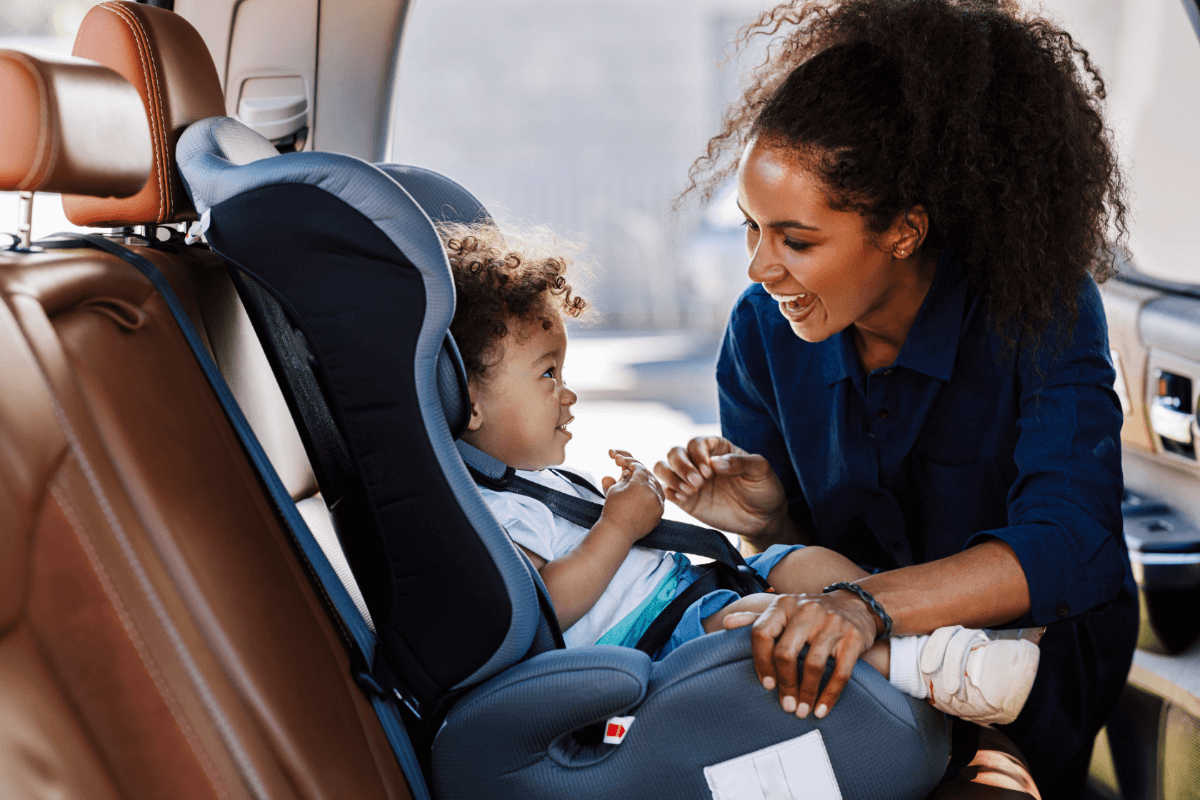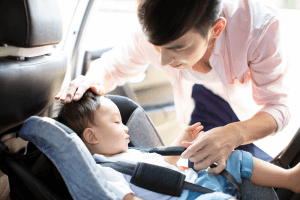
In the last ten years, the Pennsylvania General Assembly has made several changes to the car seat laws in the Commonwealth, bringing the requirements more in line with the recommendations of national associations concerned with child safety. Below, an experienced car accident lawyer discusses what you need to know about Pennsylvania’s car seat laws.
Current Car Seat Laws in Pennsylvania
With rare exceptions, Pennsylvania law requires children under age four riding anywhere in a vehicle to be secured in a child passenger restraint system that complies with Federal Motor Vehicle Safety Standards. Children ages four to seven must use a booster seat if they have outgrown a car seat. As of 2016, if a child is under age two, the restraint system must be rear-facing, and the child must use it until the height and weight requirements specified by the manufacturer have been outgrown.
The Commonwealth of Pennsylvania does not require children of any age to ride in the back seat. After a child turns eight, they are only required to wear a regular adult seat belt. Exemptions are allowed where the use of a restraint system would be impractical for medical reasons or due to the size of a child.
Car seat laws are designed to promote safety, not penalize offenders. Providing the correct type of restraint system is the responsibility of the persons riding in a vehicle with children. Entities that make, sell, loan, or rent motor vehicles have no legal responsibility to equip the vehicles with approved child safety restraint systems.
What Happens When Children Aren’t Properly Restrained in Cars
Not having a child properly restrained within a motor vehicle is extremely risky and can be fatal. Car crashes are a leading cause of death for children ages 1 to 13 in the United States. The National Safety Council (NSC) reports a child under 13 is involved in a crash every 33 seconds.
In the most recent year of reporting, there were 711 child passengers ages 12 and under killed in motor vehicle crashes, according to the Centers for Disease Control and Prevention (CDC). Of those who did not survive, 36% were not restrained. While the use of child restraints in vehicles is not a guarantee of safety, the CDC states proper car seat use reduces the risk of injury to children by 71% – 82%.
In its most recent crash report, the Pennsylvania Department of Transportation (PennDOT) noted that close to 81% of people involved in vehicle crashes were wearing seat belts, and less than 7% were unrestrained. Yet, unrestrained occupants made up nearly half of all traffic fatalities. Another PennDOT study showed children under 4 in car seats during a crash were uninjured 83% of the time.
National Recommendations for Use and Positioning of Car Seats
All states require the use of child safety seats, but the laws vary from state to state. There are 19 states that require children under two years old to be in rear-facing car seats. Most states require some type of booster seat to be used as a child transitions from a car seat to an adult belt restraint.
The NSC recommends that children up to two years old always ride in rear-facing safety seats and that all children under age 13 ride in the back seat. The NSC would also like to see seatbelts on school buses and for children under age two to be properly restrained in a separate seat on airplanes.
Subject to the height and weight specifications provided by manufacturers, the National Highway Transportation Safety Administration (NHTSA) suggests using the following restraints and only in a back seat until a child reaches age 13:
- Rear-facing – Birth to three years
- Forward-facing – After the child outgrows rear-facing until age seven
- Booster – After the child outgrows forward-facing until age 12
- Belt only – When the lap belt rests across the upper thighs, not the stomach, and the shoulder belt crosses the shoulder and chest, not the neck or face
Penalties for Violating Car Seat Laws
There are few penalties for violating car seat laws when viewed against the potential risk to children who are not safely restrained during crashes. Violation of car seat laws cannot be used as evidence of contributory negligence in civil actions. Nor can a car seat violation be the basis for the criminal charge of homicide by vehicle.
Violators will pay a fine of $75 plus court and some other costs. Any funds collected are placed in the Child Passenger Restraint Fund and used to purchase car seats for loaner programs.
The fine can be avoided if the violator can show that an appropriate car or booster seat has been acquired either by purchase, gift, or loan.
How to Pick the Right Car Seat for Your Child and Your Vehicle
How well a car seat fits both a child and the car the child is riding in has a lot to do with the quality of the protection it can afford. Selecting the appropriate car seat and making sure it is secured in the vehicle ensures a child will have the maximum protection in the event of an auto accident.
PennDOT offers the following advice for choosing the right car seat and installing it properly:
- Select the appropriate type of safety restraint system based on a child’s age and size.
- Use NHTSA’s Car Seat Finder and Ease-of-Use Ratings to compare brands.
- Refer to car seat instructions and the vehicle owner’s manual for car seat installation information.
- Have the car seat installed by or checked for proper installation at one of Pennsylvania’s many Fitting Stations. Or take advantage of a free child seat safety check offered by the Pennsylvania State Police.
- Register the car seat to receive recall and safety notices.
- Avoid using car seats from yard sales or hand-me-down sources, as they may have been in an accident that compromised their effectiveness.
It is recommended children use a car seat until they grow beyond the size specifications for safe use and sit in the back seat until at least age 13. In many counties throughout the Commonwealth, car seat loan programs can provide child safety seats to help families in need keep their children safe on the roads.
From Understanding Pennsylvania Car Seat Laws to Assisting with Motor Vehicle Accidents, SMT Legal is Here for You
Though properly installed child safety restraint systems certainly improve a child’s chances of escaping injury during a crash, they are not always able to provide complete protection. Injuries to children from car accidents can have a big impact on how they grow up and what their future may hold. Personal injury compensation should cover the current damages as well as other anticipated losses that can be expected to result in the coming years.
At SMT Legal, our Pittsburgh car accident lawyers focus on helping families recover compensation for injuries sustained in car accidents. Our experienced legal team is dedicated to obtaining the maximum available recovery and helping our clients get their lives back on track.

